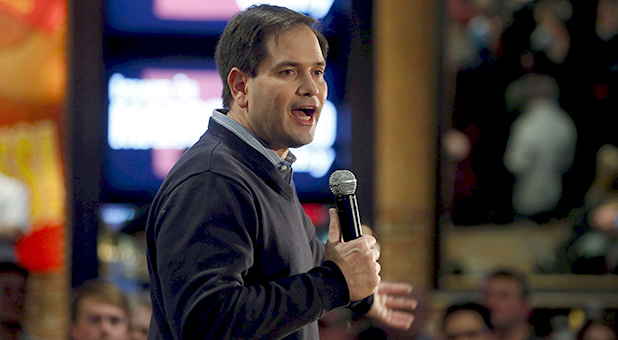Marco Rubio is relying in part on his Christian faith in his quest to win the Republican nomination for president. The Florida senator recently hired a director of faith outreach, assembled a religious advisory committee, has been interviewed in Christianity Today, and used a faith-based television ad to appeal to prospective voters in Iowa.
In November, Rubio appointed Eric Teetsel, a millennial Wheaton College graduate, to lead his effort to reach out aggressively to religiously devout Americans, especially evangelicals and conservative Catholics. In January, Rubio formed a religious liberty advisory board that includes such prominent evangelicals as theologian Wayne Grudem, National Hispanic Leadership Conference President Samuel Rodriguez, and California megachurch Pastor Rick Warren. In his Christianity Today interview, as well as in his 2012 memoir, Rubio talks candidly and cogently about his faith journey, his religious convictions and the impact that his faith has on his political positions. “The purpose of our life,” Rubio declares in his Iowa ad, “is to cooperate with God’s plan.” Rubio adds that his faith influences “everything that I do,” and affirms the evangelical position that salvation depends on accepting “the free gift … offered to us in Christ.”
Although Rubio is not polling nearly as well with potential evangelical voters in Iowa as Donald Trump or Ted Cruz, he has very strong support from many evangelical leaders. Since July 2015, World magazine has surveyed more than 100 prominent evangelicals each month about their choice for president. Rubio has led every poll by a sizable margin and in the January 2016 survey was favored by more than 70 percent of respondents. As Karen Swallow Prior, a Liberty University professor, explains, Rubio’s “record on issues like abortion and gay marriage,” “commitment to making court appointments that will uphold conservative principles” and “sheer electability” appeal strongly to evangelicals.
The Republican senator’s eclectic religious background and positions on issues make him attractive not only to evangelical leaders but also to many Catholics and Mormons. The son of Cuban immigrants, Rubio was raised in Miami as a Roman Catholic. When he was 8 years old, however, his family moved to Las Vegas, and his mother began taking her children to the Mormon Church. Along with his mother and sister, Rubio was soon baptized, and he joined the Cub Scout pack the congregation sponsored. About four years later, though, his family went back to the Catholic Church.
Impressed by Miami’s Christ Fellowship’s “phenomenal” preaching, efforts to bring “people to Jesus” and “fantastic children’s programs,” Rubio and his wife, Jeanette, worshipped almost exclusively at this large Southern Baptist congregation from 2000 to 2004. Today, they primarily attend Catholic churches in Washington, D.C., and Miami on Sunday and occasionally worship at Christ Fellowship on Saturday evening.
Although his experiences at Christ Fellowship strengthened his relationship with Jesus, Rubio returned to his Catholic roots in large part because he missed participating in the Eucharist. He carefully studied Catholicism and concluded that its sacraments and traditions were intended to teach people that God yearns to have a personal relationship with them. Rubio emphasizes that he was baptized, raised, confirmed and married in the Catholic Church and never truly left it.
Rubio explains that his faith has always been important to him, although at times he has been more dedicated to it and more involved in the life of the church. The senator says that he cannot point to a definitive conversion experience, but his faith became more vital to him as he recognized his responsibility to teach his children about Jesus, Christianity and salvation.
Rubio argues that Catholics and evangelicals both stress that Christ’s sacrificial death on the cross is the basis of God’s “free gift of salvation” and that without it “all of us would be doomed.” Rubio asserts that he has accepted Christ as his Savior and argues that Christians should allow God to shape them into “instruments of His will.”
Rubio declares that his faith “is the single greatest influence in my life” and claims that it strongly shapes his policies, especially his opposition to abortion and same-sex marriage and his efforts to help the less fortunate, hungry and imprisoned. Rubio calls for balancing compassion toward illegal immigrants with ensuring that the nation’s laws are followed. He insists that the government must “protect the right of every American to worship as they see fit, and to live out the teachings of their faith.” In dealing with other nations, Rubio argues, the United States must consistently follow moral principles and not make pragmatic decisions based simply on economic and political considerations.
Rubio insists that Christians’ faith should influence every aspect of their lives. Christians should “glorify God in everything we do,” “primarily by the way we live our lives,” and serve as “ambassadors of Christ.” Every day, Rubio asserts, he asks for “God’s guidance, direction, strength and courage.”
Rubio admires Pope Francis and applauds his desire to aid immigrants. He disagrees, however, with the pope’s perspectives on climate change and the best way to reduce income inequality. Rubio argues that when the pope discusses moral issues such as the sanctity of life and the importance of marriage and the family, he “speaks with incredible authority.” His views on economic issues, by contrast, simply express his personal perspective. Rubio contends that he has the same goal as Francis—to increase “prosperity and upward mobility,” but he maintains that this is best accomplished through the free-enterprise system rather than redistributionist measures.
Rubio’s religious background and convictions position him well to appeal to many religious conservatives. Whether this will help him to win the Republican presidential nomination remains to be seen.
Dr. Gary Scott Smith chairs the history department at Grove City College and is a fellow for faith and politics with The Center for Vision & Values.
See an error in this article?
To contact us or to submit an article






















